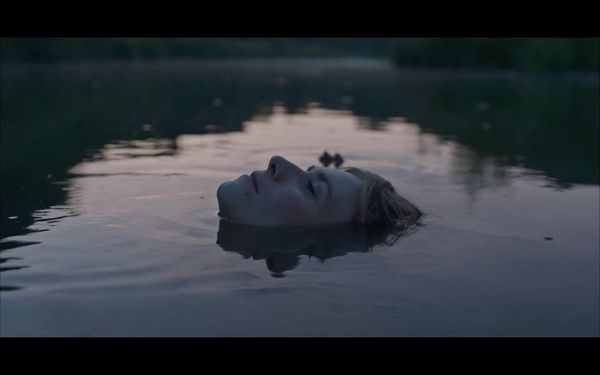Eye For Film >> Movies >> Tomorrow I Die (2024) Film Review
Tomorrow I Die
Reviewed by: Volodymyr Chernyshev

“I think I will die tomorrow,” says Irma (Niké Kurta), a cryptic figure, on the verge of giving birth. She feels isolated and insecure, residing in the rural house where her mother took her own life many years ago. Yet some deep, inner turmoil has compelled her to return. While her husband Kornél (Zalán Makranczi) is away in Paris on a business trip, Irma impulsively invites her younger brother Marci (Márton Kerekes) and her best friend, Stefi (Emöke Piti), a photographer, to join her – a perfect pretext to reconnect with long-estranged loved ones. An eerie idyll, threaded with phantom sounds, seems to conspire with an unseen force, as if the lyrical subject itself is guiding Irma towards an unknown morrow.
The film’s most captivating character is a young girl adorned with a mauve wreath. Resembling a charming, albeit eerie, Sadako, she flits across the frame. She is an ethereal presence haunting the expanse of the film. She embodies the deeply buried Electra complex within the protagonist, emerging like a fetus. She trails the bloody relics of bygone days. Her spectral hand molds the visages of all who have forgotten Irma. For as a construct of the past and a harbinger of the future, she brooks no oblivion. To forget her is fatal, as the past survives solely through memory. It is enclosed within and reliant upon it. The loss of memory, therefore, heralds a liberation from the past. It ushers in the sacred, eternal present.

Hungarian director Nikol Cybulya’s debut film, Tomorrow I Die, is steeped in a sombre atmosphere. One cannot help but inhale the dense air of angst that seems to seep from the cinema screen. As the story progresses, the bucolic settings decay. They diminish in freshness and succumb to a delusional rot.
Cinema adeptly manipulates temporality. It is not only a record of history but also a medium that defines both movement and time by its inherent laws. Augustine of Hippo, writing in the fifth century AD, pondered the nature of time. He questioned the existence of past and future, asking, “How is it that there are the two times, past and future, when even the past is now no longer and the future is now not yet?” In this context, God, as an eternal being, perceives time holistically. He exists in a perpetual present. In the universe of the film, the wrathful deity is the psychological trauma unveiled throughout the story. This aligns with a distorted Nietzschean doctrine that this god must be vanquished.
Tomorrow I Die resonates as pagan poetry. The cyclic rhyme of birth and death not only propels the intellectual tempo with a certain syncopation but also serves as a poignant reminder of time’s singularity.
Reviewed on: 17 Oct 2024














